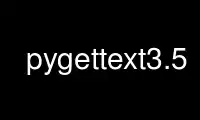
This is the command pygettext3.5 that can be run in the OnWorks free hosting provider using one of our multiple free online workstations such as Ubuntu Online, Fedora Online, Windows online emulator or MAC OS online emulator
PROGRAM:
NAME
pygettext - Python equivalent of xgettext(1)
SYNOPSIS
pygettext [OPTIONS] INPUTFILE ...
DESCRIPTION
pygettext is deprecated. The current version of xgettext supports many languages,
including Python.
pygettext uses Python's standard tokenize module to scan Python source code, generating
.pot files identical to what GNU xgettext generates for C and C++ code. From there, the
standard GNU tools can be used.
pygettext searches only for _() by default, even though GNU xgettext recognizes the
following keywords: gettext, dgettext, dcgettext, and gettext_noop. See the -k/--keyword
flag below for how to augment this.
OPTIONS
-a, --extract-all
Extract all strings.
-d, --default-domain=NAME
Rename the default output file from messages.pot to name.pot.
-E, --escape
Replace non-ASCII characters with octal escape sequences.
-D, --docstrings
Extract module, class, method, and function docstrings. These do not need to be
wrapped in _() markers, and in fact cannot be for Python to consider them
docstrings. (See also the -X option).
-h, --help
Print this help message and exit.
-k, --keyword=WORD
Keywords to look for in addition to the default set, which are: _
You can have multiple -k flags on the command line.
-K, --no-default-keywords
Disable the default set of keywords (see above). Any keywords explicitly added
with the -k/--keyword option are still recognized.
--no-location
Do not write filename/lineno location comments.
-n, --add-location
Write filename/lineno location comments indicating where each extracted string is
found in the source. These lines appear before each msgid. The style of comments
is controlled by the -S/--style option. This is the default.
-o, --output=FILENAME
Rename the default output file from messages.pot to FILENAME. If FILENAME is `-'
then the output is sent to standard out.
-p, --output-dir=DIR
Output files will be placed in directory DIR.
-S, --style=STYLENAME
Specify which style to use for location comments. Two styles are supported:
· Solaris # File: filename, line: line-number
· GNU #: filename:line
The style name is case insensitive. GNU style is the default.
-v, --verbose
Print the names of the files being processed.
-V, --version
Print the version of pygettext and exit.
-w, --width=COLUMNS
Set width of output to columns.
-x, --exclude-file=FILENAME
Specify a file that contains a list of strings that are not be extracted from the
input files. Each string to be excluded must appear on a line by itself in the
file.
-X, --no-docstrings=FILENAME
Specify a file that contains a list of files (one per line) that should not have
their docstrings extracted. This is only useful in conjunction with the -D option
above.
If `INPUTFILE' is -, standard input is read.
Use pygettext3.5 online using onworks.net services
